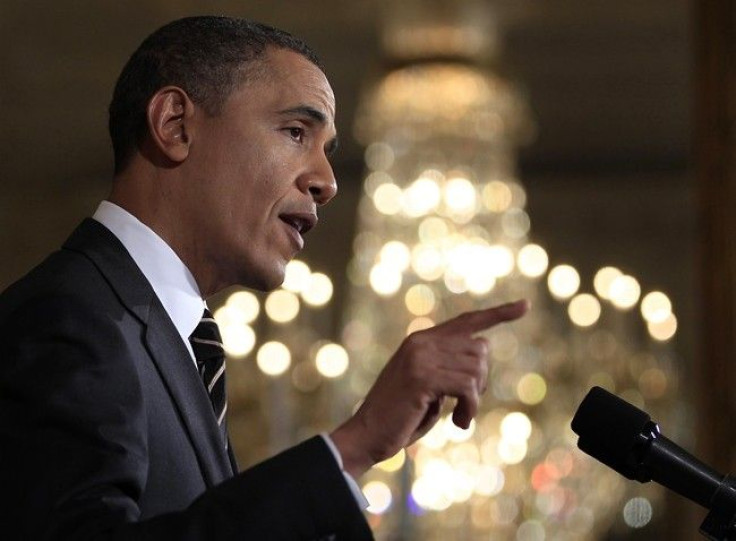Obama 2012 budget shrinks slightly, tax receipts set to rise

President Barack Obama's fiscal 2012 budget proposal to Congress showed a small decline from what is expected to be the previous year's budget, with the deficit set to decrease by nearly a third thanks mostly to higher taxes.
Total spending, called total outlays in the budget first presented on Monday, will be $3.771 trillion, down $72 billion from the expected total for fiscal 2011.
Meanwhile total receipts are expected to rise from 2011 by $435 billion to $2.609 trillion, mostly due to higher taxes.
The biggest increases are coming from higher individual income taxes, up $189 billion and higher corporate taxes, up $129 billion. Medicare payroll taxes will also go up $15 billion.
The deficit is shrinking from to $1.101 trillion in 2012 from $1.645 trillion.
Final figures may vary as Congress works on funding fiscal 2011 from March 30 to the end of September. Republicans are seeking bigger cuts than the President has estimated.
Total Outlays
Total outlays include four main categories: discretionary programs, mandatory programs, net interest, and disaster costs. The latter is relatively small compared with the rest.
Discretionary programs (36% of the 2012 budget) - which can vary and must go first through Congressional approval followed by Presidential approval - will be $1.344 trillion in 2012, compared with $1.386 trillion in 2011.
Mandatory programs (57% of the 2012 budget) - include mostly entitlement programs - are $2.109 trillion in 2012, compared with $2.177 trillion in 2011.
Such programs are determined by rules created by Congress and do not usually vary from year to year, unlike discretionary programs.
Congress must approve rule changes to mandatory programs such as Social Security, Medicare and Medicaid.
Net Interest (6.5% of the 2012 budget) will $240 billion in 2012, compared with $205 billion in 2011.
Disaster costs (1.6% of the 2012 budget) are expected to be $6 billion in 2011, compared with $2 billion in 2011. Those numbers are placeholders for major disasters requiring Federal assistance for relief and reconstruction, according to the budget.
Total Receipts
Total Receipts mostly come from three main areas.
The first two are taxes from individuals and corporations. The third, called social insurance and retirement receipts, includes Social Security payroll taxes, Medicare payroll taxes, unemployment insurance and other retirement receipts.
The remainder of receipts are much smaller than the first three. These include excise taxes, estate and gift taxes, custom duties, deposits of earnings from the Federal Reserve System and other miscellaneous receipts.
Individual income taxes in 2012, will be $1.145 trillion, up from $956 million in 2011.
Corporation incomes taxes in 2012 will be $327 billion, up from $198 billion.
Social Security pay roll taxes will be $660 billion, from $559 billion.
Medicare payroll taxes will be $202 billion, from $187 billion.
Unemployment insurance will be $57 billion, from $52 billion.
Other retirement receipts will stay at $8 billion both years.
Excise taxes will be $80 billion, from $74 billion.
Customs duties will be $31 billion, from $28 billion.
Deposits of earnings from the Federal Reserve will be $66 billion, from $80 billion in 2011.
Other miscellaneous receipts will be $20 billion, from $19 billion.
© Copyright IBTimes 2024. All rights reserved.











